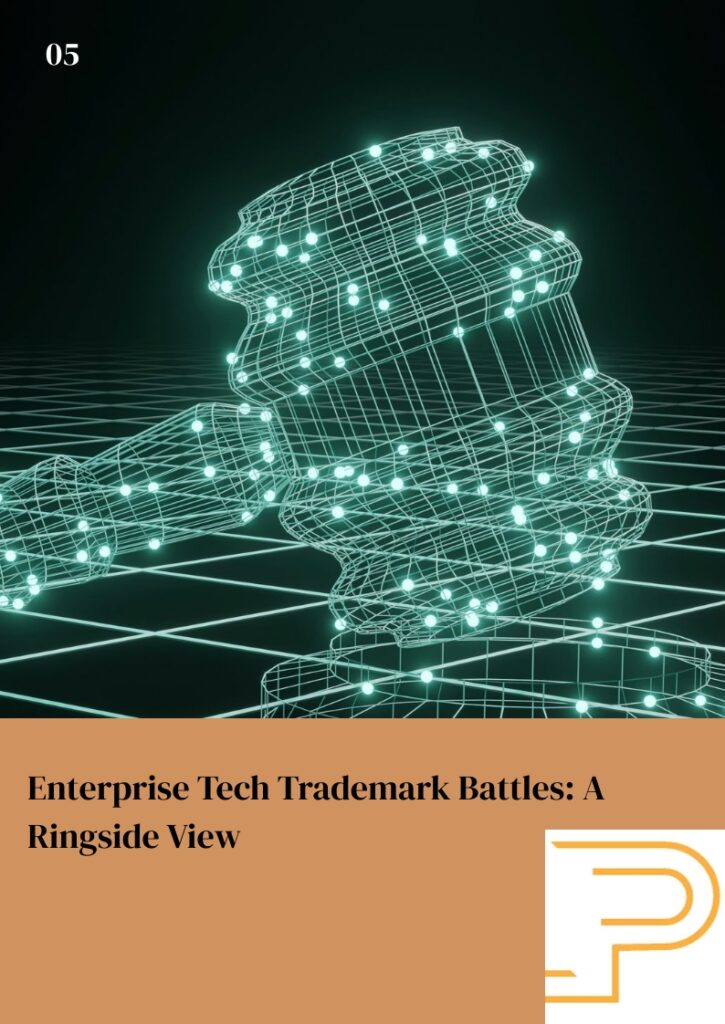
The global enterprise technology sector is a fierce battleground for innovation and market domination. Beyond technological prowess, companies in this arena also wage war on an equally critical front: the domain of intellectual property and, specifically, trademarks. With colossal sums at stake, these businesses fight tooth and nail to protect the unique identities of their products, services, and brands.
Let’s dissect three recent high-profile trademark disputes that have rocked the US enterprise tech world, offering key lessons for those maneuvering within this dynamic space.
Cloud Confusion: Oracle vs. Rimini Street
The protracted legal battle between Oracle and Rimini Street serves as a cautionary tale about the complexities of using another company’s established trademarks, even with seemingly good intentions. Let’s unpack the key arguments and implications of this case:
- Oracle’s Position: Oracle, a giant in the enterprise database software market, took issue with Rimini Street’s use of the phrase “Rimini Street Oracle Support Services.” Oracle contended that this created confusion in the marketplace, leading potential customers to believe that Rimini Street’s services were either offered by, affiliated with, or endorsed by Oracle.
- Rimini Street’s Defense: Rimini Street, specializing in independent third-party software support, maintained that their use of the word “Oracle” was purely descriptive. They argued it was necessary to accurately convey the nature of their services – that they provided support for Oracle software.
- The Middle Ground: This case highlights the tension between ‘descriptive use’ and ‘trademark infringement’. Descriptive use is often a defense businesses assert when employing a competitor’s trademark to indicate the nature of their services. However, the law sets limits on this defense. The key question becomes: does the use of the trademark go beyond mere description and, instead, generate a likelihood of confusion regarding brand affiliation or endorsement?
- Dilution and Reputation: Trademark disputes go beyond just customer confusion. Oracle additionally alleged that Rimini Street’s actions damaged the reputation of their “Oracle” trademark and diluted its distinctiveness. Rimini Street’s arguments that they were providing cheaper, potentially superior, alternatives could be seen as tarnishing Oracle’s carefully cultivated brand image.
The API Showdown: MuleSoft vs. Salesforce
This case, while superficially about the name “MuleSoft Anypoint Platform” raises profound questions about the limits of trademark protection for software functionalities and APIs (Application Programming Interfaces). Here’s a breakdown:
- The Core Issue: Salesforce, after acquiring MuleSoft, filed a lawsuit claiming that MuleSoft’s trademark “MuleSoft Anypoint Platform” was both overly descriptive and infringed on Salesforce’s existing trademarks, creating marketplace confusion. This move is unusual; often, parent companies support and champion the trademarks of their subsidiaries.
- The “Descriptive” Argument: Salesforce contended that the term “Anypoint Platform” was too generic and merely described the functionality of the software platform—helping users connect to any application, data source, or endpoint. Generic or descriptive terms often receive weaker trademark protection.
- MuleSoft’s Counterpoint: MuleSoft likely argued that while their platform does facilitate versatile connections, “Anypoint Platform” had acquired distinctiveness in the market as the name associated with their specific product; it was no longer purely descriptive.
- The Challenge of Protecting APIs: APIs are the building blocks of interconnected software systems. Businesses often want to convey the power of their API to connect with a wide array of services or endpoints. This case raises the challenge: how do you balance the need for descriptive language around API functionality with the desire to build a distinctive, protectable trademark?
Key Considerations
- Fame Can Be a Double-Edged Sword: It’s likely that both “MuleSoft” and “Salesforce” enjoyed significant brand recognition. In such cases, courts grapple with how likely less tech-savvy consumers are to dissect the individual components of a product name, or whether they’ll simply make associations based on the familiar brand names.
- Functionality vs. Branding: Where does essential software functionality end and protectable branding begin? This is a complex question at the forefront of technological innovation. The outcome of this case could have implications for how software companies develop their branding in relation to the capabilities of their products.
- Acquisition Dynamics: Parent-company-suing-subsidiary scenarios are unusual. Whether there were additional business motivations behind this specific lawsuit is a matter of speculation. Regardless, it reminds us that even within the same corporate family, IP disputes can arise.
Zoom vs. BombBomb
The meteoric rise of Zoom as a ubiquitous video conferencing platform put them on a collision course with BombBomb, a smaller company specializing in video email marketing. The dispute centered on the similarities between the two companies’ logos, demonstrating the crucial importance of protecting even visual trademarks.
- The Logos in Question: Zoom’s updated logo featured a stylized camera lens icon, rendered predominantly in blue. BombBomb’s logo also involved a stylized camera lens depiction, with a fuse on the side, rendered in a similar shade of blue. The overall visual impression of “camera” within a blue-toned geometric shape was at the heart of the dispute
- BombBomb’s Argument: BombBomb, who had been using their logo for several years without issues, initiated the lawsuit. They asserted that Zoom’s new logo was confusingly similar to their own and that Zoom, as a new entrant into the video communications arena, had a responsibility to avoid adopting visually similar marks.
- Potential for Confusion: The central question in cases like this is whether ordinary consumers are likely to be confused about the origin of the goods or services due to logo similarity. Would someone viewing Zoom’s logo be likely to think there’s a connection to BombBomb, even if the companies’ services are technically distinct?
- Implications for Businesses: This case highlights the often-overlooked importance of visual trademark protection. While companies primarily focus on wordmarks (i.e., their name or product names), their logo is equally valuable as a brand identifier. It’s crucial to secure comprehensive trademark protection for all key visual elements.
- The Power of Distinctiveness: Unique and distinctive logos are your best defense against allegations of infringement. The more your logo stands out visually, and the further away it is from common industry tropes (like the camera for video-related companies), the easier it is to protect and the less likely you are to run into disputes like this.
Key Takeaways for Enterprise Tech
These trademark battles offer vital lessons for all players in the enterprise tech sphere:
- Proactive Trademark Strategy is Key: Don’t treat trademarks as an afterthought. At the ideation stage of products, services, and brand names, conduct (or have a trademark attorney conduct) comprehensive clearance searches to identify risks early.
- Protection Extends Beyond Words: While wordmarks (company names, product names) get a lot of attention, logos and even software functionalities deserve meticulous trademark consideration.
- No Room for Complacency: Even when your trademark is registered successfully, vigilance remains critical. Monitor the marketplace for potential infringements or attempts to dilute your brand’s distinctiveness.
- IP Counsel is Your Strategic Partner: In the complex landscape of enterprise tech, an experienced IP attorney is not just a service provider but a strategic partner who helps you avoid costly pitfalls and maximize the value of your brand assets.
The enterprise tech world is an arena of relentless innovation and competition. While technological prowess is paramount, the ability to effectively protect and leverage your intellectual property is equally essential. Learning from the trademark battles of others provides a tactical advantage as you navigate this dynamic landscape.






This blog post is really helpful for us. My simple advice for visitors- if anyone wants to set up their own merchant accounts like Stripe or others, they can simply contact Diviashop for assistance in setting up while following all legal processes.
The insights shared in this blog have been incredibly valuable. I appreciate the effort put into making this content so accessible. For anyone looking to understand business formation for non-US and UK residents, click on my name.